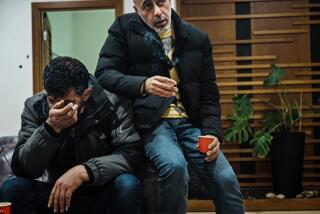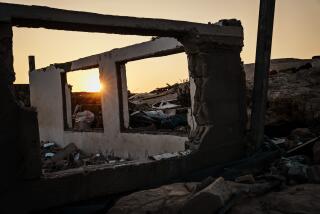60 Relatives, Some Prosperous : Abu Nidal’s Kin Live Quietly on West Bank
- Share via
NABLUS, Israeli-Occupied West Bank — Youssef Banna doesn’t go around boasting about his infamous relative, Abu Nidal. But he doesn’t try to hide the relationship, either.
“With the Israelis, whoever walks a straight line has no problems,” the 53-year-old merchant told two visitors to his small fabric shop here Monday. “All I do is go from the house to the shop, the shop to the house.”
Youssef Banna is a cousin of Sabri Banna, who, under the nom de guerre Abu Nidal, has captured the limelight as one of the world’s most notorious terrorists.
Abu Nidal’s renegade Palestinian group is blamed by the United States and Israel for the murderous Dec. 27 airport attacks in Rome and Vienna and for the Nov. 23 hijacking to Malta of an EgyptAir jetliner en route from Athens to Cairo. Fifteen travelers died in the grenade and automatic weapons assaults on the Rome and Vienna airport counters of El Al Israel Airlines, and 60 people died in the course of the Malta hijacking.
Quiet, Prosperous Lives
While Abu Nidal, whose whereabouts are not known, hatches plots against Israel and anyone who befriends this country, shopkeeper Youssef Banna and about 60 of the terrorist’s other relatives live quiet and, in at least some cases, prosperous lives here on the Israeli-occupied West Bank.
Abu Nidal’s brother, Mohammed Khalil Banna, is a large fruit and fish wholesaler in Nablus who does considerable business with the Israelis and reputedly speaks perfect Hebrew.
Youssef Banna’s son, Mirwan, is serving a 30-year jail term in Britain for his role in the attempted assassination in 1982 of Israel’s then-ambassador to London, Shlomo Argov. Abu Nidal claimed responsibility for that attack, which Israel cited as the last straw that led to its invasion a few days later of Lebanon to crush what it called a Palestinian “state within a state” in the southern part of that country.
However, most of the terrorist’s relatives here, like most other West Bank Palestinians, say they have little sympathy for Abu Nidal’s politics.
‘Entitled to His Views’
“Everybody is entitled to his own views,” said Youssef Banna in an interview. However, he added: “I don’t think (Abu Nidal’s) way is fruitful. There is no better way than peace.”
“He’s not very loved here on the West Bank because he’s acting against the Arabs and against Arafat,” said the shopkeeper’s 19-year-old son, Majid.
Until recently, Abu Nidal’s followers have been more notorious for their attacks against Arab leaders whom they consider too moderate than for their actions against Israel. An early ally of Palestine Liberation Organization leader Yasser Arafat, Abu Nidal broke openly with the Palestinian mainstream in 1974 and was sentenced to death in absentia by the PLO.
Daoud Koutab, managing editor of the English-language edition of the pro-PLO East Jerusalem newspaper Al Fajr, commented, “The top and the best PLO men have been gunned down by Abu Nidal and his supporters.
Many Negative Opinions
“So most people here have a very strong (negative) opinion about him and his actions,” Koutab added, “although obviously there is a very tiny minority which, in a way, feels relieved when they hear of any action that is a way of venting their frustrations over the situation that they live in.”
The Bannas are among the Palestinian families that have lost the most to the Jewish state.
They had lived in and around Jaffa, on the Mediterranean coast, for 400 years before the 1948 Arab-Israeli war after the U.N. partition of Palestine. The family prospered in the textile and fruit-exporting businesses.
They left Jaffa “of our own will” as the 1948 fighting raged, Youssef Banna recalled. “We thought we were leaving only for a week. So we took only blankets and mattresses and a few basic things.”
‘Father of the Struggle’
He was 16 at the time, the shopkeeper said. The future Abu Nidal (the name means “father of the struggle” in Arabic) was 11.
The Bannas scattered throughout the Middle East. There were about 500 in the clan in 1948, Youssef Banna said. His branch and that of Abu Nidal were among those who came to Nablus. “It’s the best town,” the shopkeeper said. “It’s the biggest, and we knew the merchants here.”
Youssef Banna said he has not seen his notorious cousin for 25 years or more. But he recalls no early signs that the youth would become a hunted terrorist. “No, no, no,” he replied when asked if Abu Nidal had been an angry young man. “He was a very ordinary man--very calm.”
Abu Nidal went to Saudi Arabia to work in the late 1950s and began his political activity there.
News From the Radio
Youssef Banna said the family has no knowledge of Abu Nidal’s whereabouts or his state of health. “We know about him only from the radio,” he said.
It is known that Abu Nidal gave an interview to the West German magazine Der Spiegel in Libya last fall, and Israeli and U.S. officials believe that he is still there, drawing his primary logistical support from the Tripoli regime. Libyan leader Moammar Kadafi said Sunday that Abu Nidal is not currently in Libya but that he visits there frequently.
More to Read
Sign up for Essential California
The most important California stories and recommendations in your inbox every morning.
You may occasionally receive promotional content from the Los Angeles Times.













